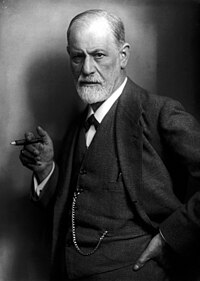
Sigmund Freud
Psychoanalytic Therapy
- Founder- Sigmund Freud (Corey, 2012).
- Key concepts- view of human nature, structure of personality, consciousness and unconscious, anxiety, ego-defense mechanisms, and development of personality (Corey, 2012).
- View of human nature- this concept according to Freud says that a person's behavior is based completely on our unconsciousness and our basic instincts that develop in our first stages of life with relation to our psycho-sexual stage. Libido was one of the first terms Freud used to describe the sexual drive/energy of a person but then broadened his term to life instincts (Corey, 2012).
- Structure of personality- this concept refers to the id, ego, and superego according to Freud. Id being the first personality, ego comes later and is thought to regulate the personality, and superego is the right or wrong of a person's moral behavior (Corey, 2012).
- Consciousness and the unconscious- this concept is very important when trying to understand a person's behavior and or the problem's of a personality. The unconscious cannot truly be studied but can be related dreams or memories that are thought to be symbolic.
- Anxiety- this is very important with psychoanalytic therapy and usually can be identified as a feeling of dread or really anxious. The three types of anxiety are reality, neurotic, and moral (Corey,2012). Reality is the dread or thoughts of danger from the world around us. Neurotic is a dread that our internal instincts will overtake us and cause us to make a mistake that we will get punished for. Moral is the fear of doing something against one's own moral standards.
- Ego-defense mechanisms- this helps a person to deal with anxiety and not let it overwhelm them. This defense has two thing in common: 1. deny reality, 2. operate on unconscious level (Corey,2012).
- Development of personality- Three stages that are common in bringing a person to counseling when not resolved are oral, anal, phallic stages (Corey, 2012). Oral stage which is the fear of falling in love with someone or having a close relationship and the person usually has low self-esteem. Anal stage is when a person has no concept of anger. Phallic stage is the inability of a person to accept their sexuality and or sexual feelings, and having unsure feelings about themselves being a man or women.
- Therapeutic goals- the main goal of psychoanalytic therapy is to become more adaptive and which will decrease conflict within a person. Also in relation to the Freud theory this therapy should make the unconscious conscious and add strength to the ego and make a person's behavior be more in relation to reality than instinct (Corey,2012). With this therapy it is hoped to achieve a better understanding not only intellectually but within a person.
- Psychoanalytic therapy is considered a long-term therapy.
References
Corey, G. (2012). Theory and Practice of Counseling and Psychotherapy (9th edition). Belmont, CA:
Brooks/Cole.
Good job, nice layout.
ReplyDeleteNeed to include information about techniques (fore example with Freud: dream analysis, word association, etc).
Grade = 9/10
Manhattan Institute for Psychoanalysis specializes in high quality psychotherapy, therapy and counseling service. Click Here.
ReplyDeleteManhattan Institute for Psychoanalysis specializes in high quality psychotherapy, therapy and counseling service. Click Here.
ReplyDelete